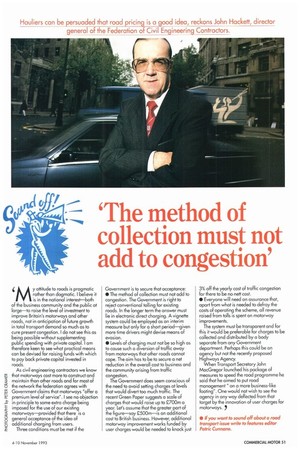'The method of collection must not add to congestion'
Page 53

If you've noticed an error in this article please click here to report it so we can fix it.
4 y attitude to roads is pragmatic
rather than dogmatic. I believe it is in the national interest—both of the business community and the public at large—to raise the level of investment to improve Britain's motorways and other roads, not in anticipation of future growth in total transport demand so much as to cure present congestion. I do not see this as being possible without supplementing public spending with private capital. I am therefore keen to see what practical means can be devised for raising funds with which to pay back private capital invested in roads.
As civil engineering contractors we know that motorways cost more to construct and maintain than other roads and for most of the network the federation agrees with Government claims that motorways "offer a premium level of service". I see no objection in principle to some extra charge being imposed for the use of our existing motorways—providec:1 that there is a general acceptance of the idea of additional charging from users. Three conditions must be met if the Government is to secure that acceptance: • The method of collection must not add to congestion. The Government is right to reject conventional tolling for existing roads. In the longer term the answer must lie in electronic direct charging. A vignette system could be employed as an interim measure but only for a short period—given more time drivers might devise means of evasion.
• Levels of charging must not be so high as to cause such a diversion of traffic away from motorways that other roads cannot cope. The aim has to be to secure a net reduction in the overall cost to business and the community arising from traffic congestion.
The Government does seem conscious of the need to avoid setting charges at levels that would divert too much traffic. The recent Green Paper suggests a scale of charges that would raise up to £700m a year. Let's assume that the greater part of the figure—say 2500m—is an additional cost to British business. However, additional motorway improvement works funded by user charges would be needed to knock iust
3% off the yearly cost of traffic congestion for there to be no nett cost.
• Everyone will need an assurance that, apart from what is needed to defray the costs of operating the scheme, all revenue raised from tolls is spent on motorway improvements. The system must be transparent and for this it would be preferable for charges to be collected and distributed by a body separate from any Government department. Perhaps this could be an agency but not the recently proposed Highways Agency. When Transport Secretary John MacGregor launched his package of measures to speed the rood programme he said that he aimed to put rood management " on a more business-like footing". One would not wish to see the agency in any way deflected from that target by the innovation of user charges for motorways.




























































































